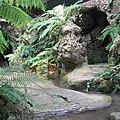Dewstow House
| Dewstow House | |
|---|---|
 | |
| Type | House |
| Location | Caerwent, Monmouthshire |
| Coordinates | 51°35′45″N 2°46′06″W / 51.5958°N 2.7683°WCoordinates: 51°35′45″N 2°46′06″W / 51.5958°N 2.7683°W |
| Built | C.1800 |
| Architectural style(s) | Georgian |
| Governing body | Privately owned |
Listed Building – Grade II | |
| Official name | Dewstow House |
| Designated | 28 October 1976 |
| Reference no. | 23039 |
Listed Building – Grade II* | |
| Official name | Dewstow Grottoes and Gardens |
| Designated | 29 March 2000 |
| Reference no. | 23059 |
 Location of Dewstow House in Wales | |
Dewstow House, Caldicot, Monmouthshire, Wales, is an earlier nineteenth century villa in a Neoclassical style. The house is notable as the site of "one of the strangest gardens in Wales."[1] The building itself is plain; described by architectural writer John Newman as a "simple three-bay villa",[2] it has extensive views over the Severn Estuary. It is a Grade II listed building.[3]
Within, and under, the grounds lies a "network of very rare and unusual underground gardens"[4] constructed in the late nineteenth and early twentieth centuries. Comprising "underground passages and top-light chambers with artificial rock-work and stalactities,"[2] the garden structures have three separate Grade II* listings as a result of their importance.[5][6][7] After the death of the garden's creator, Harry Oakley, in 1940, the gardens were gradually abandoned.[8] In the 1960s, during the construction of the M4 motorway and the Severn Bridge, soil from these sites was used to fill in the grottoes and pools.[8]
The gardens were rediscovered, excavated and restored at the beginning of the twenty first century and are now open to the public.[9]
Gallery[]
Notes[]
- ^ Whittle 1992, p. 78.
- ^ a b Newman 2000, p. 161.
- ^ "Dewstow House – Caerwent – Monmouthshire – Wales". British Listed Buildings. 1976-10-28. Retrieved 2012-02-12.
- ^ "Dewstow House, Garden, Calidcot | Site Details". Coflein. Retrieved 2012-02-12.
- ^ "Grotto about 30m to the south east of Dewstow House – Caerwent – Monmouthshire – Wales". British Listed Buildings. 2000-03-29. Retrieved 2012-02-12.
- ^ "Grotto, Underground Garden and Bridge about 60m to west of Dewstow House – Caerwent – Monmouthshire – Wales". British Listed Buildings. 2000-03-29. Retrieved 2012-02-12.
- ^ "Terrace, Wall, Grotto and Underground Garden about 5m to north west of Dewstow House, Caerwent, Monmouthshire, Wales". British Listed Buildings. 2000-03-29. Retrieved 2012-02-12.
- ^ a b Attlee 2009, p. 94.
- ^ "Digging Deep". Retrieved 2016-02-16.
References[]
- Attlee, Helena (2009). The Gardens of Wales. London: Frances Lincoln. ISBN 978-0-7112-2882-5.
- Newman, John (2000). Gwent/Monmouthshire. The Buildings of Wales. London: Penguin. ISBN 0-14-071053-1.
- Whittle, Elisabeth (1992). The Historic Gardens of Wales. Cardiff: CADW. ISBN 9780117015784.
External links[]
| Wikimedia Commons has media related to Dewstow House, Monmouthshire, Wales. |
- Grade II listed buildings in Monmouthshire
- Grade II* listed buildings in Monmouthshire
- Country houses in Monmouthshire










